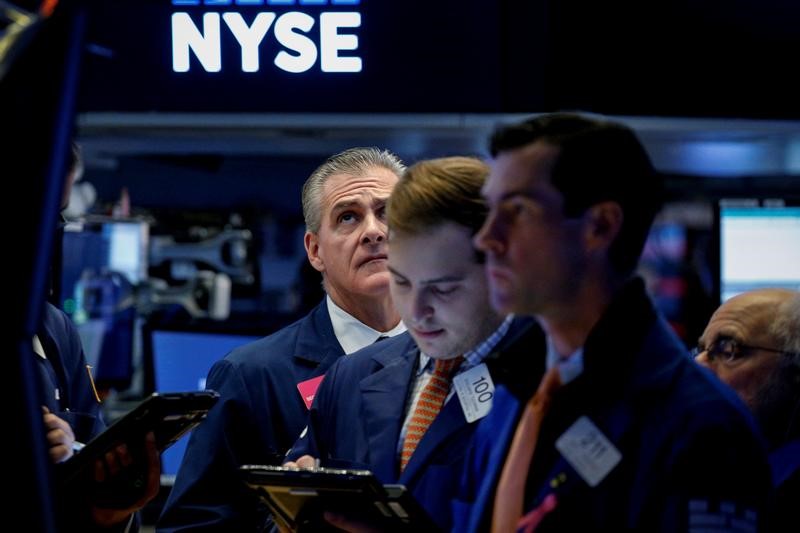Investing.com - This week investors will get the chance to hear from Federal Reserve officials after the central bank indicated last week that further policy easing may not be on the cards after its third rate cut this year. Newly minted European Central Bank President Christine Lagarde is to speak on Monday and the Bank of England will release its newly renamed Monetary Policy Report on Thursday. Trade developments and earnings will also remain in the spotlight.
Here’s what you need to know to start your week.
- Fedspeak and U.S. data
A host of Fed policymakers will have the chance to discuss their take on the monetary policy outlook this week, including New York Fed President John Williams, Philadelphia Fed chief Patrick Harker, Chicago Fed head Charles Evans and Dallas’s Robert Kaplan.
Markets now expect interest rates to remain on hold until at least April, according to Investing.com’s Fed Rate Monitor Tool following last week’s cut, the third in as many meeting. The move was accompanied with new language indicating that the current "mid-cycle" round of rate cuts was at an end.
It’s a light week on the U.S. economic calendar, but investors will get an update on factory orders on Monday, with economists expecting a decline of 0.5% MoM. Meanwhile, Thursday’s trade data will be scrutinized for signs of fallout from the Sino-U.S. trade war.
- New ECB boss Lagarde to set out vision
The ECB’s new President, Christine Lagarde is expected to outline her vision for the Eurozone economy and monetary policy in a speech in Berlin on Monday. Lagarde, who assumed her role on Nov. 1, has already echoed her predecessor Mario Draghi by criticizing Germany and the Netherlands for not investing their budget surpluses to support growth.
Lagarde will get an update on the health of the bloc’s economy on Wednesday and Thursday when Germany releases data on factory orders and industrial production, amid fears that the euro area’s largest economy is slipping into a recession.
The European Commission is also set to publish its economic forecasts for the region on Thursday.
- Brexit, election and the BOE
The Bank of England will be launching its rebranded Inflation Report as the Monetary Policy Report on Thursday. The new report will focus on forecasts and ad-hoc analysis rather than merely reviewing the previous quarter.
Interest rates are expected to remain on hold at 0.75% given the Dec. 12 snap election and a new Jan. 31 Brexit deadline.
But the BOE has been edging away from long-term guidance that rates are on an upward path, noting in September that this hinged on Brexit and the global economy picking up. Policymaker Michael Saunders has said since then the BOE cannot wait indefinitely for Brexit uncertainty to lift, and that economic slowdown strengthens the case for easing policy.
Some policymakers doubt a rate cut would do much good. Deputy Governor Dave Ramsden fears the slowdown is damaging the economy's productive capacity so lower interest rates are more likely to boost inflation than lift growth.
- Earnings
It's a close call but for the S&P 500, the third 2019 quarter could bring the first quarterly year-over-year earnings decline since 2016.
Despite earnings beats from tech heavyweights Apple (NASDAQ:AAPL) and Facebook (NASDAQ:FB), earnings are expected to have declined 0.8%, according to IBES Refinitiv. That's better than earlier forecasts - a month ago, a 2.2% decline was predicted.
Q1 and Q2 estimates also started negative yet ended positive. So upcoming reports by names such Occidental Petroleum (NYSE:OXY), CVS Health (NYSE:CVS), Qualcomm (NASDAQ:QCOM) and Walt Disney (NYSE:DIS) may well move the needle across the line.
No such hope for Europe. The STOXX index is seeing the worst quarterly earnings in more than three years, according to Refinitiv. It expects Q3 earnings to drop 8.4%, the biggest quarterly fall since mid-2016.
Also, of European companies to report so far, 59.3% exceeded analyst estimates. The U.S. figure is 75%.
- Trade developments
U.S. Trade Representative Robert Lighthizer and Treasury Secretary Steven Mnuchin made progress on a variety of issues during a telephone call on Friday with China’s Vice Premier Liu He about an interim trade agreement, USTR said in a statement on Friday.
Meanwhile, U.S. President Donald Trump on Friday suggested he could sign a long-awaited trade agreement in Iowa.
Trump said on Friday evening that negotiations about a "phase one" agreement were going well and he hoped to sign the deal with Chinese President Xi Jinping at a U.S. location when work on the agreement was completed.
Trump and Xi had been expected to ink the agreement at the Asia Pacific Economic Cooperation summit in Santiago, Chile from Nov. 16-17, but those plans were thrown into disarray on Wednesday when Chile withdrew as host of the meeting.
It was not immediately clear whether China would agree to sign the trade deal in the U.S.
--Reuters contributed to this report
